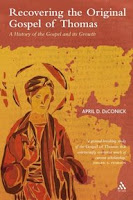RBL Review of Recovering the Original Gospel of Thomas
/ It was very nice to come into my office this morning and open my e-mail to find the newest installment of RBL, and on it a review praising my book.
It was very nice to come into my office this morning and open my e-mail to find the newest installment of RBL, and on it a review praising my book.Professor Eric Noffke (Facoltà Valdese di Teologia, Rome, Italy) has written and published a very complimentary review of my book Recovering the Original Gospel of Thomas. It can be accessed at RBL here. I am very flattered that he sees it as a "great book" that "sets the stage for a new chapter in this field of research."
Perhaps the most meaningful part of his review to me personally though is that he felt in my writing my conviction that the Gospel of Thomas is one of our most significant early Christian texts, not because it is a sensational thing to say, but because this is where my "serious scientific research" has led me. He writes:
To date, the Gospel of Thomas has been valued mainly by those scholars who wished to picture the historical Jesus as a teacher of wisdom and self-consciously a popular preacher, a wise man whose image was changed by his disciples after his death into that of an apocalyptic prophet of judgment and doom. A well known and effective popular writer of this line of scholarship is, for instance, Elaine Pagels. But many other scholars reject this approach both because it forces the historical data we have on Jesus and because it is founded on a debatable interpretation of the Gospel of Thomas that, above all, decontextualizes the historical Jesus. That is why most scholars see this apocryphal Gospel as suspect but also with the uneasy feeling that somehow "something good" is hiding in it. DeConick's book will free the Gospel of Thomas from these suspicions and bring it back to the center of the research on the historical Jesus and of Christian origins.








































































